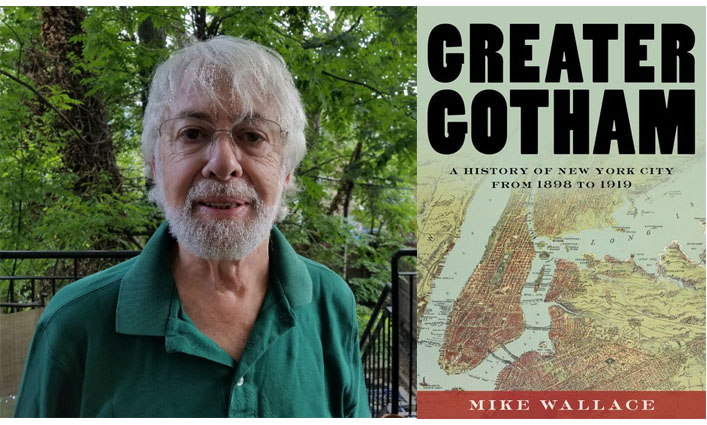
(New York, NY) With a focus on the metamorphosis of New York City at the start of the 20th century, John Jay College Professor Mike Wallace’s Greater Gotham: A History of New York City from 1898 to 1919 (Oxford University Press) tells a story so compelling it was selected for the Ralph Waldo Emerson Award presented by Phi Beta Kappa at its Annual Book Awards dinner.
“It's a great honor to be chosen by such a prestigious and long-lived society (founded in 1776!),” said Wallace, a Distinguished Professor of History. “I'm particularly pleased to join such distinguished recipients, including my mentor Richard Hofstadter.”
Established in 1960, the Ralph Waldo Emerson Award is offered for scholarly studies that contribute significantly to interpretations of the intellectual and cultural condition of humanity. It carries a $10,000 prize.
Greater Gotham covers a period of immense change and growth in New York City; including the consolidation with Brooklyn, the introduction of massive infrastructure and a maturing of the financial economy. Over the past 100 years the city has continued to grow and change but still maintains its core identity.
“New York is constantly upgrading itself, but the version that emerged in the early 1900s is definitely recognizable, both for its iconic structures (skyscrapers, railroad terminals, public libraries), and macroeconomic sectors (banking, corporate headquarters, media center, tourist mecca), and the diversity -- and inequality -- of its citizenry,” said Professor Wallace who is also director of the Gotham Center for New York City History.
Greater Gotham is the sequel to the Pulitzer Prize winner Gotham: A History of New York City to 1898 which was co-written by Wallace and Edwin G. Burrows.
Wallace is already deep into the writing of the next book in the series, which will chronicle New York City from the end of World War I to the end of World War II. “Further volumes will depend on sufficient longevity!” added Wallace.
About John Jay College of Criminal Justice:
An international leader in educating for justice, John Jay College of Criminal Justice of the City University of New York is a Hispanic Serving Institution and Minority Serving Institution offering a rich liberal arts and professional studies curriculum to 15,000 undergraduate and graduate students from more than 135 nations. John Jay is home to faculty and research centers at the forefront of advancing criminal and social justice reform. In teaching, scholarship and research, the College engages the theme of justice and explores fundamental human desires for fairness, equality and the rule of law. For more information, visit www.jjay.cuny.edu and follow us on Twitter @JohnJayCollege.



